- Home
- T. H. White
The Once and Future King (#1-4) Page 6
The Once and Future King (#1-4) Read online
Page 6
Mrs Roach held out a languid fin, sighed emphatically and said, ‘Ah, doctor, so you’ve come at last?’
‘Hum,’ said the physician, in his deepest tone.
Then he told everybody to close their eyes – the Wart peeped – and began to swim round the invalid in a slow and stately dance. As he danced he sang. His song was this:
Therapeutic,
Elephantic,
Diagnosis,
Boom!
Pancreatic,
Microstatic,
Anti—toxic,
Doom!
With a normal catabolism,
Gabbleism and babbleism,
Snip, Snap, Snorum,
Cut out his abdonorum.
Dyspepsia,
Anaemia,
Toxaemia.
One, two, three,
And out goes He,
With a fol—de—rol—derido for the Five Guinea Fee.
At the end of the song he was swimming round his patient so close that he actually touched her, stroking his brown smooth—scaled flanks against her more rattly pale ones. Perhaps he was healing her with his slime – for all the fishes are said to go to the Tench for medicine – or perhaps it was by touch or massage or hypnotism. In any case, Mrs Roach suddenly stopped squinting, turned the right way up, and said, ‘Oh, doctor, dear doctor, I feel I could eat a little lob—worm now.’
‘No lob—worm,’ said Merlyn, ‘not for two days. I shall give you a prescription for a strong broth of algae every two hours. Mrs Roach. We must build up your strength, you know. After all, Rome was not built in a day.’
Then he patted all the little roaches once more, told them to grow up into brave little fish, and swam off with an air of importance into the gloom. As he swam, he puffed his mouth in and out.
‘What did you mean by that about Rome?’ asked the Wart, when they were out of earshot.
‘Heaven knows’.
They swam along, Merlyn occasionally advising him to put his back into it when he forgot, and the strange underwater world began to dawn about them, deliciously cool after the heat of the upper air. The great forests of weed were delicately traced, and in them there hung motionless many schools of sticklebacks learning to do their physical exercises in strict unison. On the word One they all lay still; at Two they faced about; at Three they all shot together into a cone, whose apex was a bit of something to eat. Water snails slowly ambled about on the stems of the lilies or under their leaves, while fresh—water mussels lay on the bottom doing nothing in particular. Their flesh was salmon pink, like a very good strawberry cream ice. The small congregation of perch – it was a strange thing, but all the bigger fish seemed to have hidden themselves – had delicate circulations, so that they blushed or grew pale as easily as a lady in a Victorian novel. Only their blush was a deep olive colour, and it was the blush of rage. Whenever Merlyn and his companion swam past them, they raised their spiky dorsal fins in menace, and only lowered them when they saw that Merlyn was a tench. The black bars on their sides made them look as if they had been grilled, and these also could become darker or lighter. Once the two travellers passed under a swan. The white creature floated above like a Zeppelin, all indistinct except what was under the water. The latter part was quite clear and showed that the swan was floating slightly on one side with one leg cocked over its back.
‘Look,’ said the Wart, ‘it is the poor swan with the deformed leg. It can only paddle with one leg, and the other side of it is hunched.’
‘Nonsense,’ said the swan snappily, putting its head into the water and giving them a frown with its black nares. ‘Swans like to rest in this position, and you can keep your fishy sympathy to yourself, so there.’ It continued to glare at them from above, like a white snake suddenly let down through the ceiling, until they were out of sight.
‘You swim along,’ said the tench, ‘as if there was nothing to be afraid of in the world. Don’t you see that this place is exactly like the forest which you had to come through to find me?’
‘Is it?’
The Wart looked, and at first saw nothing. Then he saw a small translucent shape hanging motionless near the surface. It was just outside the shadow of a water—lily and was evidently enjoying the sun. It was a baby pike, absolutely rigid and probably asleep, and it looked like a pipe stem or a seahorse stretched out flat. It would be a brigand when it grew up.
‘I am taking you to see one of those,’ said the tench,’ the Emperor of these purlieus. As a doctor I have immunity, and I dare say he will respect you as my companion as well – but you had better keep your tail bent in case he is feeling tyrannical.’
‘Is he the King of the Moat?’
‘He is. Old Jack they call him, and some call him Black Peter, but for the most part they do not mention him by name at all. They just call him Mr P. You will see what it is to be a king.’
The Wart began to hang behind his conductor a little, and perhaps it was as well that he did, for they were almost on top of their destination before he noticed it. When he did see the old despot he started back in horror, for Mr P. was four feet long, his weight incalculable. The great body, shadowy and almost invisible among the stems, ended in a face which had been ravaged by all the passions of an absolute monarch – by cruelty, sorrow, age, pride, selfishness, loneliness and thoughts too strong for individual brains. There he hung or hoved, his vast ironic mouth permanently drawn downward in a kind of melancholy, his lean clean—shaven chops giving him an American expression, like that of Uncle Sam. He was remorseless, disillusioned, logical, predatory, fierce, pitiless – but his great jewel of an eye was that of a stricken deer, large, fearful, sensitive and full of griefs. He made no movement, but looked upon them with his bitter eye.
The Wart thought to himself that he did not care for Mr P.
‘Lord,’ said Merlyn, not paying attention to his nervousness, ‘I have brought a young professor who would learn to profess.’
‘To profess what?’ asked the King of the Moat slowly, hardly opening his jaws and speaking through his nose.
‘Power,’ said the tench.
‘Let him speak for himself.’
‘Please,’ said the Wart, ‘I don’t know what I ought to ask.’
‘There is nothing,’ said the monarch, ‘except the power which you pretend to seek: power to grind and power to digest, power to seek and power to find, power to await and power to claim, all power and pitilessness springing from the nape of the neck.’
‘Thank you.’
‘Love is a trick played on us by the forces of evolution. Pleasure is the bait laid down by the same. There is only power. Power is of the individual mind, but the mind’s power is not enough. Power of the body decides everything in the end, and only Might is Right.
‘Now I think it is time that you should go away, young master, for I find this conversation uninteresting and exhausting. I think you ought to go away really almost at once, in case my disillusioned mouth should suddenly determine to introduce you to my great gills, which have teeth in them also. Yes, I really think you might be wise to go away this moment. Indeed, I think you ought to put your back into it. And so, a long farewell to all my greatness.’
The Wart had found himself almost hypnotized by the big words, and hardly noticed that the tight mouth was coming closer and closer to him. It came imperceptibly, as the lecture distracted his attention, and suddenly it was looming within an inch of his nose. On the last sentence it opened, horrible and vast, the skin stretching ravenously from bone to bone and tooth to tooth. Inside there seemed to be nothing but teeth, sharp teeth like thorns in rows and ridges everywhere, like the nails in labourers’ boots, and it was only at the last second that he was able to regain his own will, to pull himself together, to recollect his instructions and to escape. All those teeth clashed behind him at the tip of his tail, as he gave the heartiest jack—knife he had ever given.
In a second he was on dry land once again, standing beside Merlyn on the piping drawbri
dge, panting in his stuffy clothes.
Chapter VI
One Thursday afternoon the boys were doing their archery as usual. There were two straw targets fifty yards apart, and when they had shot their arrows at one, they had only to go to it, collect them, and shoot back at the other, after facing about. It was still the loveliest summer weather, and there had been chicken for dinner, so that Merlyn had gone off to the edge of their shooting—ground and sat down under a tree. What with the warmth and the chicken and the cream he had poured over his pudding and the continual repassing of the boys and the tock of the arrows in the targets – which was as sleepy to listen to as the noise of a lawn—mower or of a village cricket match – and what with the dance of the egg—shaped sun—spots between the leaves of his tree, the aged man was soon fast asleep.
Archery was a serious occupation in those days. It had not yet been turned over to Indians and small boys. When you were shooting badly you got into a bad temper, just as the wealthy pheasant shooters do today. Kay was shooting badly. He was trying too hard and plucking on his loose, instead of leaving it to the bow.
‘Oh, come on,’ he said. ‘I am sick of these beastly targets. Let’s have a shot at the popinjay.’
They left the targets and had several shots at the popinjay – which was a large, bright—coloured artificial bird stuck on the top of a stick, like a parrot – and Kay missed these also. First he had the feeling of, ‘Well, I will hit the filthy thing, even if I have to go without my tea until I do it.’ Then he merely became bored.
The Wart said, ‘Let’s play Rovers then. We can come back in half an hour and wake Merlyn up.’
What they called Rovers, consisted in going for a walk with their bows and shooting one arrow each at any agreed mark which they came across. Sometimes it would be a molehill, sometimes a clump of rushes, sometimes a big thistle almost at their feet. They varied the distance at which they chose these objects, sometimes picking a target as much as 120 yards away – which was about as far as these boys’ bows could carry – and sometimes having to aim actually below a close thistle because the arrow always leaps up a foot or two as it leaves the bow. They counted five for a hit, and one if the arrow was within a bow’s length, and they added up their scores at the end.
On this Thursday they chose their targets wisely. Besides, the grass of the big field had been lately cut, so that they never had to search for their arrows for long, which nearly always happens, as in golf, if you shoot ill—advisedly near hedges or in rough places. The result was that they strayed further than usual and found themselves near the edge of the savage forest where Cully had been lost.
‘I vote,’ said Kay, ‘that we go to those burrows in the chase, and see if we can get a rabbit. It would be more fun than shooting at these hummocks.’
They did this. They chose two trees about a hundred yards apart, and each boy stood under one of them waiting for the conies to come out again. They stood still, with their bows already raised and arrows fitted, so that they would make the least possible movement to disturb the creatures when they did appear. It was not difficult for either of them to stand thus, for the first test which they had had to pass in archery was standing with the bow at arm’s length for half an hour. They had six arrows each and would be able to fire and mark them all before they needed to frighten the rabbits back by walking about to collect. An arrow does not make enough noise to upset more than the particular rabbit that it is shot at.
At the fifth shot Kay was lucky. He allowed just the right amount for wind and distance, and his point took a young coney square in the head. It had been standing up on end to look at him, wondering what he was.
‘Oh, well shot!’ cried the Wart, as they ran to pick it up. It was the first rabbit they had ever hit, and luckily they had killed it dead.
When they had carefully gutted it with the hunting knife which Merlyn had given – to keep it fresh – and passed one of its hind legs through the other at the hock, for convenience in carrying, the two boys prepared to go home with their prize. But before they had unstrung their bows they used to observe a ceremony. Every Thursday afternoon, after the last serious arrow had been shot, they were allowed to fit one more nock to their strings and to shoot the arrow straight up into the air. It was partly a gesture of farewell, partly of triumph, and it was beautiful. They did it now as salute to their first prey.
The Wart watched his arrow go up. The sun was already westing toward evening, and the trees where they were had plunged them into a partial shade. So, as the arrow topped the trees and climbed into sunlight, it began to burn against the evening like the sun itself. Up and up it went, not weaving as it would have done with a snatching loose, but soaring, swimming, aspiring to heaven, steady, golden and superb. Just as it had spent its force, just as its ambition had been dimmed by destiny and it was preparing to faint, to turn over, to pour back into the bosom of its mother earth, a portent happened. A gore—crow came flapping wearily before the approaching night. It came, it did not waver, it took the arrow. It flew away, heavy and hoisting, with the arrow in its beak.
Kay was frightened by this, but the Wart was furious. He had loved his arrow’s movement, its burning ambition in the sunlight, and, besides, it was his best one. It was the only one which was perfectly balanced, sharp, tight—feathered, cleannocked, and neither warped nor scraped.
‘It was a witch,’ said Kay.
Chapter VII
Tilting and horsemanship had two afternoons a week, because they were the most important branches of a gentleman’s education in those days. Merlyn grumbled about athletics, saying that nowadays people seemed to think that you were an educated man if you could knock another man off a horse and that the craze for games was the ruin of scholarship – nobody got scholarships like they used to do when he was a boy, and all the public schools had been forced to lower their standards – but Sir Ector, who was an old tilting blue, said that the battle of Crécy had been won upon the playing fields of Camelot. This made Merlyn so furious that he gave Sir Ector rheumatism two nights running before he relented. Tilting was a great art and needed practice. When two knights jousted they held their lances in their right hands, but they directed their horses at one another so that each man had his opponent on his near side. The base of the lance, in fact, was held on the opposite side of the body to the side at which the enemy was charging. This seems rather inside out to anybody who is in the habit, say, of opening gates with a hunting crop, but it had its reasons. For one thing, it meant that the shield was on the left arm, so that the opponents charged shield to shield, fully covered. It also meant that a man could be unhorsed with the side or edge of the lance, in a kind of horizontal swipe, if you did not feel sure of hitting him with your point. This was the humblest or least skilful blow in jousting.
A good jouster, like Lancelot or Tristram, always used the blow of the point, because, although it was liable to miss in unskilful hands, it made contact sooner. If one knight charged with his lance held rigidly sideways to sweep his opponent out of the saddle, the other knight with his lance held directly forward would knock him down a lance length before the sweep came into effect.
Then there was how to hold the lance for the point stroke. It was no good crouching in the saddle and clutching it in a rigid grip preparatory to the great shock, for if you held it inflexibly like this its point bucked up and down to every movement of your thundering mount and you were practically certain to miss the aim. On the contrary, you had to sit loosely in the saddle with the lance easy and balanced against the horse’s motion. It was not until the actual moment of striking that you clamped your knees into the horse’s sides, threw your weight forward in your seat, clutched the lance with the whole hand instead of with the finger and thumb, and hugged your right elbow to your side to support the butt.
There was the size of the spear. Obviously a man with a spear one hundred yards long would strike down an opponent with a spear of ten or twelve feet before the latter came anywhere nea
r him. But it would have been impossible to make a spear one hundred yards long and, if made, impossible to carry it. The jouster had to find out the greatest length which he could manage with the greatest speed, and he had to stick to that. Sir Lancelot, who came some time after this part of the story, had several sizes of spear and would call for his Great Spear or his Lesser Spear as occasion demanded.
There were the places on which the enemy should be hit. In the armoury of The Castle of the Forest Sauvage there was a big picture of a knight in armour with circles round his vulnerable points. These varied with the style of armour, so that you had to study your opponent before the charge and select a point. The good armourers – the best lived in Warrington, and still live near there – were careful to make all the forward or entering sides of their suits convex, so that the spear point glanced off them. Curiously enough, the shields of Gothic suits were more inclined to be concave. It was better that a spear point should stay on the shield, rather than glance off upward or downward, and perhaps hit a more vulnerable point of the body armour. The best place of all for hitting people was on the very crest of the tilting helm, that is, if the person in question were vain enough to have a large metal crest in whose folds and ornaments the point would find a ready lodging. Many were vain enough to have these armorial crests with bears and dragons or even ships or castles on them, but Sir Lancelot always contented himself with a bare helmet, or a bunch of feathers which would not hold spears, or, on one occasion, a soft lady’s sleeve.
It would take too long to go into all the interesting details of proper tilting which the boys had to learn, for in those days you had to be a master of your craft from the bottom upward. You had to know what wood was best for spears, and why, and even how to turn them so that they would not splinter or warp. There were a thousand disputed questions about arms and armour, all of which had to be understood.

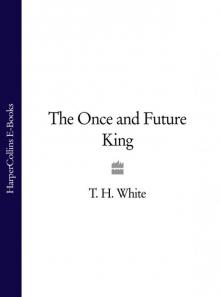 The Once and Future King (#1-4)
The Once and Future King (#1-4) Once & Future King 05 - The Book of Merlyn
Once & Future King 05 - The Book of Merlyn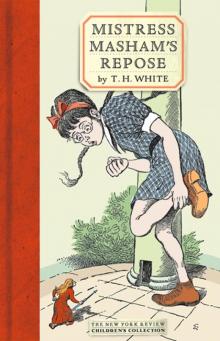 Mistress Masham's Repose
Mistress Masham's Repose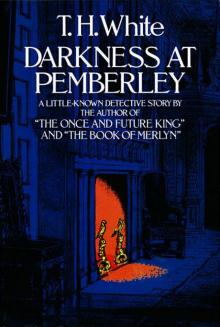 Darkness at Pemberley
Darkness at Pemberley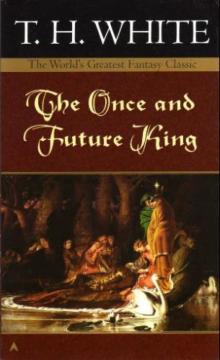 The Once and Future King
The Once and Future King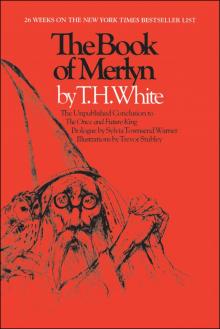 The Book of Merlyn
The Book of Merlyn Candle in the Wind
Candle in the Wind